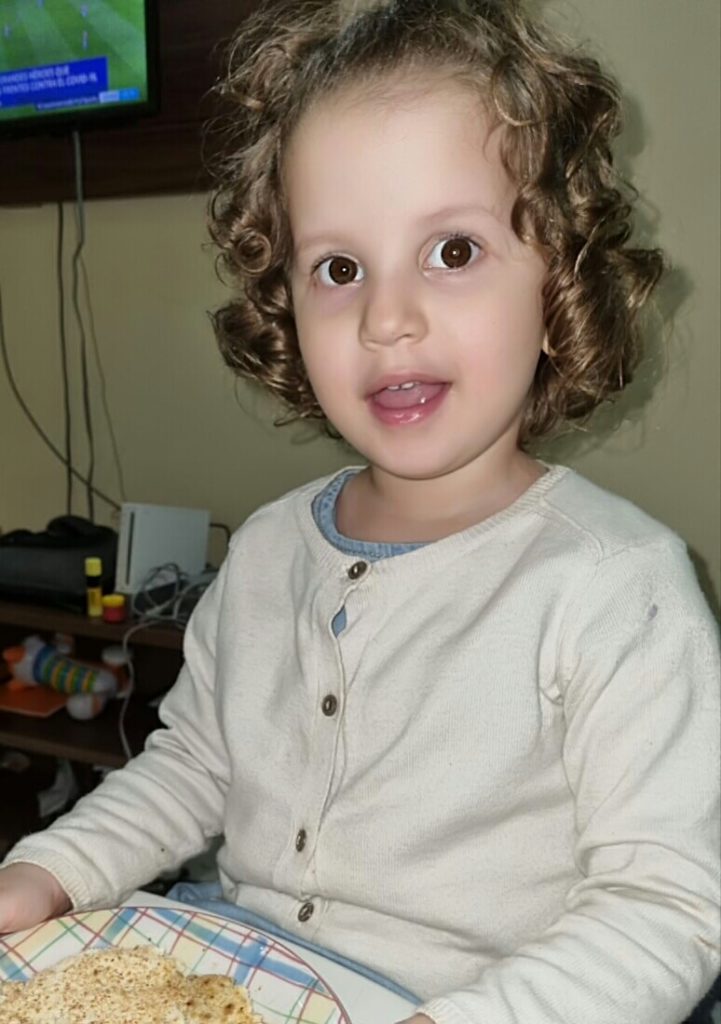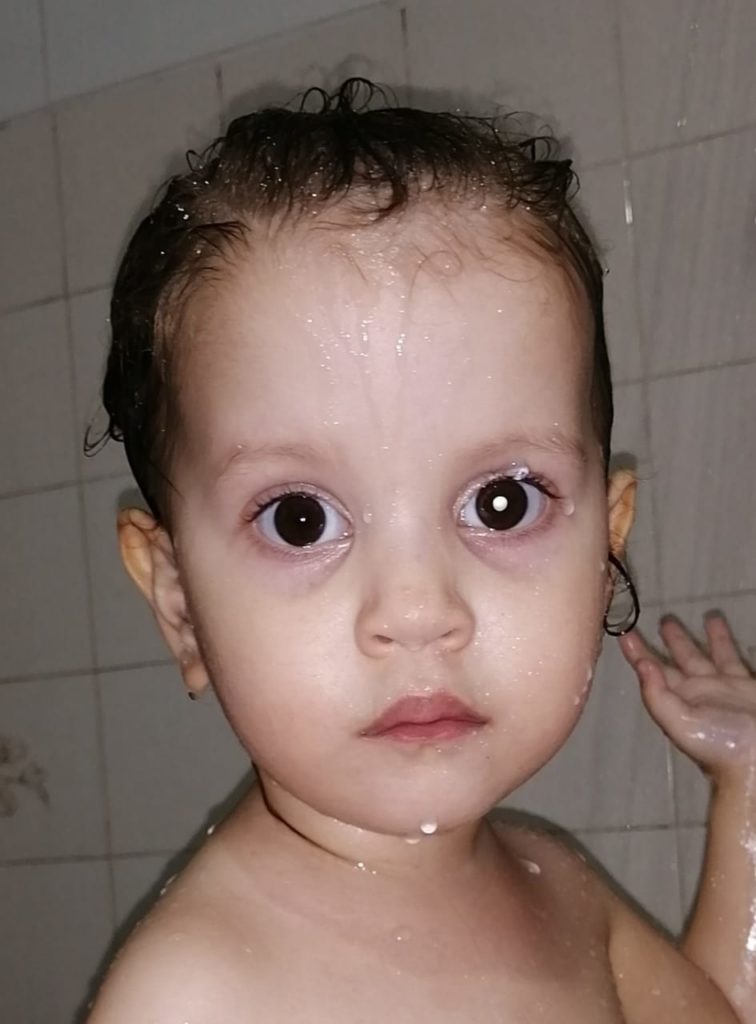Diagnosis: Retinoblastoma
Derlis says he vividly remembers the first time he noticed the Glow in his daughter Olivia’s left eye. It was November of 2019 and Olivia was just two years old. Derlis was playing indoors with Olivia when the light hit her eye as she looked up at him. He saw what he describes as a “silver flash”. It only lasted a split second. Derlis had never heard of the Glow and did not know for sure what he saw, so he did not think much about it. But when Derlis saw this same flash a second and third time, he knew there must be more to these occurrences.
Derlis told his wife, Geraldine, about what he was noticing. She had never seen this flash in Olivia’s eye. She went to the internet and searched. She learned that a Glow (leukocoria) can occur in the flash photography of children and can be a sign of more than twenty different visual conditions. Geraldine took out her camera, made sure the flash was on and took a photo of Olivia. There it was. A bright golden glow in the pupil of her left eye. They took several more photos with her looking straight into the camera, and each time the Glow was visible.
They researched more and discovered the Glow could be signaling a tumor developing in the retina. This potentially life-threatening cancer is known as Retinoblastoma. Even though it was a Saturday night, they were able to take Olivia to her pediatrician to be examined. The pediatrician did not notice anything unusual in the exam but sent them to the local hospital in Paraguay, where they lived. Here they were examined by an ophthalmologist who performed an ultrasound. Derlis and Geraldine were heartbroken when doctors told them they clearly saw a tumor and diagnosed Olivia with Retinoblastoma. They were told the only treatment option was enucleation, removal of the eye.
Derlis and Geraldine took Olivia for a second opinion with a pediatric ophthalmologist. This doctor did both an exam under anesthesia as well as an MRI. Retinoblastoma was confirmed and once again enucleation was recommended.
Derlis and Geraldine were determined to explore all of the possible treatment options available in the world. They discovered that a new form of chemotherapy was being performed called Intra-Arterial Chemotherapy where concentrated doses of medicine are delivered directly to the eye. All evidence showed for some children this treatment was considered to be the best and most effective against retinoblastoma. This type of chemotherapy had never been done in Paraguay, however. After discussing this option with their doctors, they found a doctor who had experience in the procedure and had performed it many times abroad. After reaching out to him, they agreed to give it a try. Unfortunately, after a three hour surgery the doctors determined that Olivia was too small for this procedure to be successful. Once again, they were advised to enucleate the eye.
Still, Derlis and Geraldine persisted in their attempt to explore all possible options. They knew of a Hospital in Buenos Aires, Argentina, with extensive experience in treating retinoblastoma, where they performed hundreds of sessions of Intra-Arterial Chemotherapy every year. With high hopes, they immediately took a flight to Buenos Aires and managed to see the head of ophthalmology at this Argentinian hospital, who, after evaluating Olivia’s case, also recommended urgent enucleation. Heartbroken and hopeless, Derlis and Geraldine returned to Paraguay and reluctantly set a date for enucleation.
While all of this was happening a good friend of the family (an Italian man living in Paraguay) had been doing his own research in his home country of Italy. He knew there were hospitals in Italy that were renowned for their ocular oncology treatments. He learned the name of a specialist, Doris Hadjistilianou, who heads the Unit of Ophthalmic Oncology at Santa Maria alle Scotte Clinic in Siena. He believed she would be able to treat Olivia. The family friend managed to get Dr. Doris and Olivia’s parents in touch. After several conversations and sending all of Olivia’s images, Dr. Hadjistilianou agreed to have them come to Siena for treatment.
Once again, this time on Christmas Eve, Derlis, Geraldine, and Olivia hopped on a plane and headed to Italy. On December 27th, Dr. Hadjistilianou did her own exam under anesthesia. Derlis and Geraldine were shocked by her findings. Dr. Hadjistilianou changed Olivia´s original diagnosis. She explained Olivia had a retinoma – the benign version to retinoblastoma. She explained that the bottom part of the tumor was a retinoma, while on the top she could see retinoblastoma cells starting to grow. She also explained that as things stood, enucleation was completely unnecessary. With an updated, correct diagnosis – retinoma with a malign transformation into retinoblastoma, she recommended trying IAC once again. And in January of 2020, Olivia had her first successful round.
A few weeks later they were informed that the tumor had shrunk 80%. Derlis and Geraldine were thrilled! Olivia was given a second round of IAC. They waited in Italy for twenty more days and did another EUA. They were again given wonderful news, all of the tumors were now dead. Since the family needed to travel back to Paraguay, they performed a third round of IAC before leaving Italy. It was Feb of 2020 and Covid was spreading across Europe. The family knew they may not have the opportunity to return for some time.
Since then Olivia has had an EUA every three months in Paraguay. Her tumors continue to shrink. She has been in remission for over a year and a half and has some vision in her left eye. Olivia will be 4 years old on Sept 2nd, 2021. She is an active, happy, healthy little girl who loves Peppa Pig, singing, coloring and playing with her twin brother and older sister.
Derlis and Geraldine are determined to help as many other children battling retinoblastoma that they can. They personally mentor several RB families in Paraguay each year. They are also determined to spread awareness about the Glow. They hope that by sharing their story other families will be aware of this potentially life-saving sign and get their children the care they need more quickly. They know time is very important in the successful treatment of every one of the conditions that can present with the Glow and are so happy that they were able to find and treat Olivia’s condition in time.



